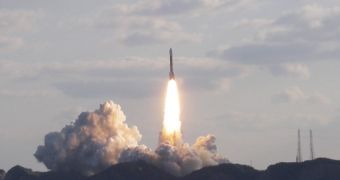The Japanese Aerospace Exploration Agency (JAXA) managed to conclude its first commercial deal, of delivering multiple satellites into orbit, aboard its H2A rockets, which will thus have their structural integrity and reliability tested. This trial will be very important for the Japanese, because it's one of their last chances to prove investors that their space program can compete with that of the European Union, the United States, the Russian Federation, and, as of late, China.
The new mission, which will take off on January 21st, will carry approximately 8 satellites into orbit. The greenhouse gas-monitoring device “Ibuki” will keep an eye on the transformations our atmosphere undergoes, while the purposes of the other seven “baby” satellites have not yet been disclosed. One of them is JAXA's own creation, while the others belong to various university-based research groups and private companies. The space agency decided to give everyone a lift because it had room to spare on its rocket and also wanted to show the world it had the ability to lift massive cargo to orbit.
The truth is that Japan's space program is severely under-funded, so the agency has to go the extra mile to ensure that at least private funds keep coming in. By securing more satellite delivery contracts, its management hopes to be able to fund some of the organization's more ambitious objectives, such as the Selene-2 moon landing, which is aimed at certifying the artificial objects left behind by the American space mission on its first incursion.
"If we can successfully launch the seven mini satellites, this could be an excellent precedent for commercial use in the future," said Jaxa spokeswoman Asaka Hagiwara.
"With the new law that allows space programs for defense purposes, we expect there will be more opportunities for development and launches of various kinds of satellites," added JAXA spokesman Tatsuo Oshima, who said that the agency also expected to receive a large amount of military contracts as well, in addition to its civilian applicants.
Agency representatives also announced that the lunch would cost only $91.7 million, which is the lowest sum ever recorded for such a complex mission. Currently, JAXA is working on a way to extend its launch capabilities, considering that its main site is subjected to many regulations and cannot send rockets in space during the peak fishing season, according to an agreement made with local farmers.

 14 DAY TRIAL //
14 DAY TRIAL //